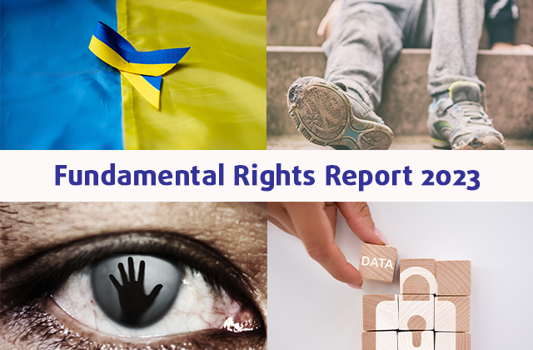The European Union Agency for Fundamental Rights publishes its 2023 Annual Report [editar]

The European Union Agency for Fundamental Rights (FRA) Fundamental Rights Report 2023 reflects the progress and gaps in the protection of human rights in the EU in 2022.
The chapter on the Roma People includes a detailed monitoring of topics such as the school segregation of the Roma students, the lack of social participation, cases of antigypsyism and discrimination, police violence, the serious situation of poverty and access to housing, with numerous examples from EU Member States, and examples of discrimination against Ukrainian Roma people fleeing the war, in Slovakia, Germany, Hungary, Poland and the Czech Republic.
The report summarizes and analyses the main developments in the area of human rights in the EU in 2022. It contains proposals for action covering: the EU Charter of Fundamental Rights and its use by Member States; equality and non-discrimination; racism and other forms of intolerance; Roma inclusion and equality; asylum, borders and migration; information society, privacy and data protection; rights of the child; access to justice; and the implementation of the United Nations Convention on the Rights of Persons with Disabilities (CRPD).
Its analysis section covers the fundamental rights implications of the Russian aggression against Ukraine and the challenges this war has brought. For example, the EU Temporary Protection Directive provided access to work, housing, social assistance, education and medical care to many people affected by this war.
Other key fundamental rights issues in 2022 addressed by the report include:
Increase in child poverty: the pandemic and rising energy costs put more children, almost 1 in 4, at risk of poverty. The EU and national governments must comply with actions under the European Child Guarantee which started in 2022 and use the funds to alleviate child poverty, in particular for poor and vulnerable households such as single-parent, Roma and migrants.
Widespread hate: hate crimes and hate speech, especially online, remained problematic in 2022, fuelled in part by Russia's aggression against Ukraine. But only half of the EU countries had national action plans against racism (NAPARs). The report insists that more countries should develop such plans, as well as concrete local and regional measures to tackle racism.
Safeguarding rights as technology advances in its development: the effective protection of fundamental rights as more digital and artificial intelligence services are implemented is a growing concern. The landmark EU Digital Services Act of 2022 recognized the need for strong rights protection, which must be monitored in its implementation. EU lawmakers should also ensure that similar strong guarantees are in place in the proposed Artificial Intelligence Act currently being debated in the EU.
Chapter on Equality and Inclusion of the Roma People
The report, in its extensive section on the Roma people, highlights that by 2022 most EU Member States have developed action plans and started to implement their national strategic frameworks to meet the 2030 targets of the EU Strategic Framework for equality, inclusion and participation of the Roma People. In the course of the year, most Member States also drew up the national action plans for the effective implementation of the European Child Guarantee; several Member States focus on strengthening the education and inclusion of Roma children.
The report provides detailed monitoring of issues such as the school segregation of Roma students, the lack of social participation, cases of antigypsyism and discrimination, police violence, the serious situation of poverty and access to housing, with numerous examples of the EU Member States, and examples of discrimination against Ukrainian Roma people, fleeing the war, in Slovakia, Germany, Hungary, Poland and the Czech Republic.
Some positive advances in Spain are mentioned, such as the approval of the Comprehensive Law for Equal Treatment and Non-Discrimination, the modification of the Penal Code to include antigypsyism as a possible motivation for a hate crime, the start of the Commission on Antigypsyism in Parliament, and the renewal of the members of the State Council of the Roma People.
The FRA presented the results of the Survey on the situation of the Roma People carried out in 2021. Its results show little or no progress since the last survey in 2016 in the fight against antigypsyism and equal access to education, employment, housing and health. The fundamental rights of Roma people were still not fully respected in 2022. Antigypsyism, discrimination, poverty and social exclusion, as well as hate crimes and hate speech, continue to affect a disproportionate number of Roma throughout the EU. The fatal incidents due to police violence with Roma victims in 2022 indicate that institutional racism in the police sphere must be addressed.
Regarding the situation of Roma women, the report highlights the European Parliament Resolution of July 2022 on women's poverty, where Roma women are recognized as a particularly vulnerable group. It calls on the Commission to ensure the participation of Roma girls and women at all levels, and on Member States to complement EU financial support with study programmes and projects that give Roma girls and women the opportunity to access continuing education and higher education. In the EU countries surveyed, the majority of Roma women aged 16-24 (69%) neither study nor work. This percentage is notably higher than that of Roma men in this age group (44%) and much higher than that of the general population (11%). Projects that offer employment opportunities, specifically for Roma women, remain rare.
Structural racism in the public health systems of certain Member States has led to serious violations of the fundamental rights of Roma women. In the Czech Republic, a law granting compensation to Roma women who were sterilized against their will came into force on January 1, 2022, but civil society organizations criticized the Ministry of Health for the complexity of the process, leading to significant delays in granting these compensations.
A legislative proposal to compensate illegally sterilized women in Slovakia, introduced in 2022, is still pending approval.
FRA’s Opinions
The report includes an annex of FRA Opinions on various topics; in the section on the Roma people (opinions 5.1 to 5.5) the FRA points out the following points:
- Member States should take urgent measures to provide all Roma people living in segregated settlements in conditions of severe housing deprivation with access to decent housing that is accessible, affordable, environmentally safe, healthy and desegregated. To achieve this, they must make use of the available EU funds.
- Member States are encouraged to establish platforms and build the social capacities among Roma civil society, including women, children and young people. Member States should consider promising practices in other EU countries and make full use of EU funds to establish platforms for cooperation with civil society organisations and local and regional stakeholders in the implementation, monitoring and review of the national action plans and strategies.
- EU Member States must ensure efficient monitoring through the regular collection and use of equality data. Such efforts must monitor the use of funds, as well as measures and programmes to achieve the 2030 goals of equality, participation and inclusion of Roma people. Member States are encouraged to ensure that their data collection, including national censuses, comply with the human rights-based approach. They should take into account EU guidance on the collection and use of equality data based on racial or ethnic origin. Member States should actively encourage and promote cooperation between civil society, academia, equality bodies and statistical offices to facilitate reporting and regular monitoring of cases of discrimination, antigypsyism and hate crimes.
- EU Member States must end any segregation of Roma students in education and collect evidence of this segregation, fully implementing the Racial Equality Directive. Member States should prioritize and use EU and national funds to provide quality education and more training opportunities for Roma children, involving Roma civil society in the design, implementation and monitoring of their national measures.
- EU Member States must strengthen their efforts to address poverty and social exclusion of Roma people. This will require specific measures combining gainful employment and the allocation of social transfers to achieve the 2030 target of closing the poverty gap between Roma and the general population, as required by the EU Roma Strategic Framework. Member States should specifically address Roma children in their EU Child Guarantee National Action Plans. They must identify, plan and implement measures to incorporate Roma women into the world of work, improve their economic independence and protect them from poverty.
Annex on Ukraine
The report includes another annex on the War in Ukraine and the impact it has had on fundamental rights. The FRA mentions that national human rights institutions, civil society and international organizations expressed concern about the discriminatory treatment of certain groups upon arrival in the EU, at initial reception facilities or during subsequent transport. These groups include citizens of non-Ukrainian third countries; lesbian, gay, bisexual, transgender, and intersex people; Roma; stateless and people with disabilities
Research by countries - Spain
These reports constitute reference material for the 'Fundamental Rights Report 2023' project. The research for each country was prepared by FRA's research network, Franet. The information and opinions contained in the document do not necessarily reflect the opinions or official position of the FRA.
The report develops the advances in the defense of fundamental rights in Spain in the year 2022, in relation to equality and non-discrimination, racism and xenophobia, antigypsyism, asylum, information society, children's rights, access to justice, and the implementation of the Convention on the rights of persons with disabilities. It includes an annex on good practices and jurisprudence.
We appreciate that the report on Spain includes several references to the work of the Fundación Secretariado Gitano: the FSG Annual Report 2021, the Evaluation of Results of the Acceder Programme, the awareness-raising campaign The Challenge of Tomorrow, the Pilot study on school segregation of the Roma students, and the Annual Report on Discrimination and the Roma Community 2022 and its approach to biases in Artificial Intelligence systems and algorithms. In the section on jurisprudence, the FRA Report highlights the case undertaken by the Fundación Secretariado Gitano in defense of a family from Burgos who suffered anti-Roma harassment as the most relevant ruling of the year in violations of the rights of Roma people.

